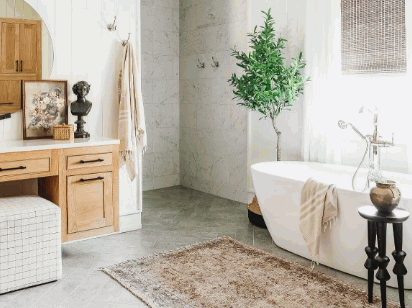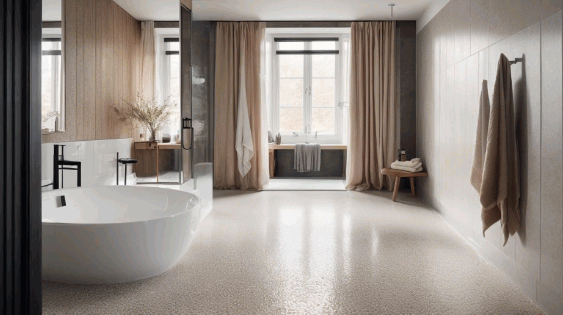
Resin flooring has gained popularity in recent years due to its versatility and durability, making it a popular choice for various spaces including bathrooms. In this comprehensive guide, we will explore the different types of resin flooring, such as epoxy, polyurethane, and methyl methacrylate (MMA), and delve into the benefits and drawbacks of using resin flooring in bathrooms.
We will also discuss the factors to consider when determining if resin flooring is suitable for a bathroom, as well as provide valuable insights on how to properly maintain and care for this type of flooring in a bathroom setting. Whether you are considering resin flooring for a residential or commercial bathroom, this article will equip you with the essential knowledge to make an informed decision.
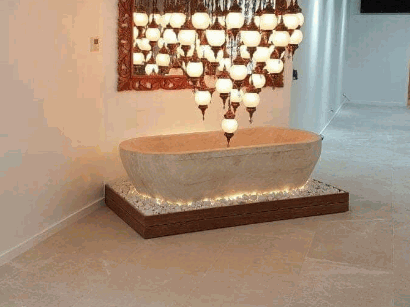
Table of Contents
Resin flooring, also known as resinous flooring, is a versatile and modern flooring solution that offers a seamless finish and a wide range of design options. It is a popular choice for both residential and commercial properties due to its practical application and long-lasting properties.
Due to its chemical composition, resin flooring is highly resistant to chemicals, oils, and solvents, making it an ideal choice for industrial and commercial settings. The installation process involves applying multiple layers of the resin material, resulting in a strong and durable surface.
Resin flooring is available in a variety of colors and finishes, allowing for customization to complement any interior design. One of the disadvantages of resin flooring is that it can be prone to scratches and may require professional installation.
Find out more: How To Make Epoxy Floor Look Like Marble

Resin flooring encompasses various types, with the prominent ones being epoxy resin flooring, polyurethane resin flooring, and methyl methacrylate (MMA) resin flooring, each offering distinct properties and applications.
Epoxy resin flooring is known for its durability, cost-effectiveness, and seamless finish, making it a popular choice for various projects. The installation process and cleaning regimen for epoxy resin floors are relatively straightforward, contributing to their widespread appeal.
The installation of epoxy resin flooring involves preparing the concrete substrate, applying the epoxy resin, and allowing it to cure to form a strong, seamless surface. This process ensures a long-lasting and low-maintenance floor. When it comes to costs, epoxy resin flooring is cost-effective in the long run due to its durability and minimal need for repairs.
The smooth, non-porous surface of epoxy resin floors makes them easy to clean and maintain, requiring simple regular sweeping and occasional mopping with a mild detergent.
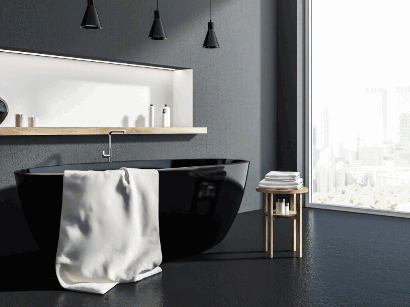
Polyurethane resin flooring offers exceptional durability, aesthetic appeal, and a variety of design options, although it may have specific drawbacks in comparison to other resin flooring types. Understanding its properties and comparing it to alternative options is essential for informed decision-making.
The high impact resistance and ability to withstand heavy foot traffic make polyurethane resin flooring an ideal choice for commercial and industrial spaces. Its seamless and non-porous nature also enhances hygiene and makes it easy to clean, reducing maintenance costs and ensuring a long-lasting finish.
Compared to epoxy or acrylic resin flooring, polyurethane can be more expensive and may require professional installation due to its chemical composition and curing process.
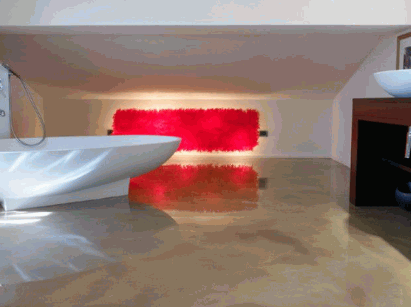
Methyl Methacrylate (MMA) resin flooring is renowned for its rapid installation, durability, and aesthetic appeal, making it a suitable choice for projects where time and efficiency are critical. Understanding its suitability, cost considerations, and installation process is crucial for evaluating its potential application.
The rapid installation time of MMA resin flooring significantly reduces downtime, making it particularly advantageous for commercial and industrial settings. Its durability enables it to withstand heavy foot traffic, impact, and chemicals, ensuring long-lasting performance.
The aesthetic appeal of MMA resin flooring further enhances its suitability for various spaces, offering a wide range of design options and customizable finishes. While the initial cost of MMA resin flooring may be higher than some alternatives, its long-term durability and minimal maintenance requirements make it a cost-effective choice.
The installation process, performed by trained professionals, involves careful surface preparation, application, and curing, ensuring a smooth and seamless finish that meets industry standards.
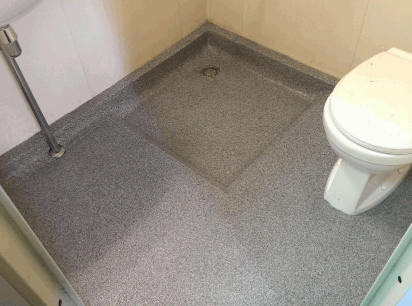
Resin flooring offers numerous benefits when used in bathrooms, including being moisture-resistant, durable, and relatively low maintenance, making it a suitable option for enhancing the aesthetics and functionality of bathroom spaces.
The moisture resistance of resin flooring is particularly advantageous in bathrooms, as it helps to prevent water damage and mold growth, ensuring a long-lasting and hygienic flooring solution. Its durability makes it suitable for high-traffic areas, providing a resilient surface that can withstand the demands of daily use.
The ease of maintenance is another key feature, as resin flooring can be easily cleaned and requires minimal upkeep, contributing to a clean and inviting bathroom environment.
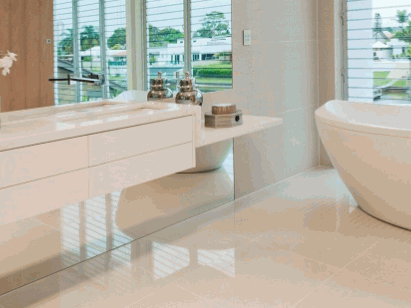
One of the key benefits of resin flooring in bathrooms is its waterproof nature, providing an effective solution for maintaining water resistance and protecting the underlying structure from moisture-related damage.
This waterproof property sets resin flooring apart from traditional flooring options in bathrooms, as it creates a seamless and impermeable surface that prevents water from seeping into the subfloor. This not only safeguards against potential water damage but also promotes a hygienic environment by inhibiting the growth of mold and mildew.
The low maintenance requirements of resin flooring make it an ideal choice for bathrooms, offering long-term durability and aesthetic appeal while ensuring optimal water resistance.
The durability of resin flooring makes it an ideal choice for bathrooms, as it can withstand daily wear and tear, offering lasting performance and a range of design options to suit various preferences and styles.
This type of flooring is resistant to moisture and stains, making it particularly well-suited for the high-traffic and potentially damp environment of a bathroom. The seamless and smooth surface of resin flooring minimizes the risk of water damage and is easy to clean, ensuring that it maintains its aesthetic appeal over time.
The extensive color and texture choices available enable homeowners to achieve a customized look, ranging from sleek and modern to warm and inviting, enhancing the overall ambiance of the bathroom.
Resin flooring in bathrooms is easy to clean and maintain, requiring minimal care to preserve its aesthetics and functionality, making it a practical choice for homeowners seeking convenient cleaning and maintenance routines.
Regular sweeping and mopping with mild soap and water are usually sufficient to keep resin flooring in top condition. The seamless nature of resin flooring prevents the accumulation of dirt and grime in grout lines, reducing the time and effort needed for cleaning.
Homeowners can also enhance the longevity of their resin flooring by applying a protective sealant periodically to maintain its luster and resilience against moisture and stains.
Another advantage of resin flooring in bathrooms is its anti-slip properties, providing a safer and slip-resistant surface that enhances the overall safety and comfort of the bathroom environment.
This slip-resistant feature is especially crucial in bathroom spaces where water spills and condensation are prevalent, as it helps to prevent accidental slips and falls. The texture and composition of resin flooring also contribute to the tactile comfort underfoot, making it an ideal choice for creating a secure and pleasant bathroom experience.
Resin flooring in bathrooms is resistant to chemicals and stains, providing protection and ensuring the maintenance of a pristine surface, improving the overall longevity and aesthetics of the bathroom space.
This resistance to chemicals and stains makes resin flooring an ideal choice for bathrooms, where exposure to water, cleaning agents, and potential spills is common. The protective properties of resin flooring not only contribute to the ease of maintenance but also ensure that the surface remains unblemished, maintaining a hygienic and visually appealing environment.
With its ability to repel common bathroom substances, resin flooring helps to uphold the integrity of the surface, promoting a durable and long-lasting flooring solution.
Despite its numerous benefits, there are certain drawbacks to using resin flooring in bathrooms, including the potential for slipperiness when wet, higher costs compared to traditional options, and the requirement for professional installation.
Slipperiness can be a significant concern with resin flooring in bathrooms, especially when water or soap residue is present, posing a risk of accidents. The initial investment for resin flooring may be higher than other flooring options, and it's important to consider long-term maintenance costs.
Professional installation is crucial for ensuring proper adhesion and durability, enhancing the overall safety and longevity of the flooring. These factors call for thorough consideration before opting for resin flooring in bathroom settings.
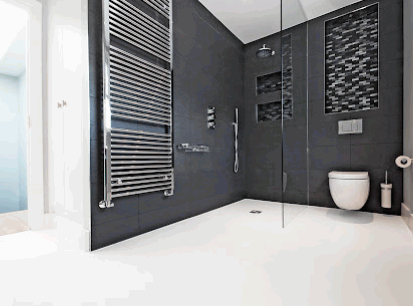
One of the drawbacks of resin flooring in bathrooms is its potential to become slippery when wet, posing a safety concern that needs to be addressed through proper measures and precautions.
This potential slipperiness of resin flooring when wet raises the need for an understanding of slip-resistant surfaces and safety measures. It's crucial to install resin flooring with anti-slip properties and apply appropriate sealants to enhance traction.
Regular maintenance, such as cleaning with non-slip solutions and promptly addressing any spills, is vital to mitigate the risk of accidents. Homeowners and businesses should also consider placing slip-resistant mats in high-risk areas to further enhance safety and reduce the likelihood of slipping incidents on resin flooring.
The cost of resin flooring for bathrooms can be relatively higher compared to traditional options, necessitating a careful evaluation of the investment and budget considerations associated with this flooring solution.
Opting for resin flooring in bathrooms requires a thorough understanding of the potential long-term benefits, as well as the initial costs involved. While the initial investment might be higher, resin flooring offers exceptional durability, resistance to moisture, and ease of maintenance, which can contribute to cost savings over time. It's crucial to factor in these long-term benefits when assessing the overall cost-effectiveness of resin flooring for bathrooms and making informed budget decisions.
The installation of resin flooring in bathrooms typically requires professional expertise, adding to the overall project costs and influencing the property value, necessitating careful consideration and planning.
Professional installation of resin flooring in bathrooms ensures that the specialized requirements, such as moisture resistance and proper adhesion, are met to achieve a durable and long-lasting result. This attention to detail not only enhances the functionality and aesthetic appeal of the space but also contributes to the overall property value.
It's crucial to factor in the initial investment in professional installation as it can save on potential future repairs and replacements, ultimately protecting the long-term value of the property.
Determining the suitability of resin flooring for a particular bathroom involves evaluating various considerations such as the size and layout of the space, the existing flooring, budget constraints, and personal preferences, ensuring a well-informed decision for the desired outcome.
These factors play a crucial role in determining the practicality and aesthetics of resin flooring. The size of the bathroom dictates the amount of material needed and the potential design options. The layout influences the seamlessness of installation and the flow of the space, while the existing flooring may require preparation for the new resin application. Budget constraints help in choosing the most cost-effective yet durable resin type. Personal preferences regarding color, texture, and maintenance level also guide the decision-making process, ensuring a tailored solution for each unique bathroom.
The size and layout of the bathroom play a crucial role in assessing the suitability of resin flooring, as it impacts the overall design flexibility, comfort, and customization options available for the flooring solution.
Understanding the dimensions and configuration of the bathroom space is vital as it directly influences the practicality and aesthetics of resin flooring. A larger bathroom may offer greater freedom for creative design choices, while a smaller one might necessitate a more efficient, space-saving approach.
The layout determines the flow of the space and can influence the seamless integration of resin flooring with other fixtures and elements in the bathroom.
Assessing the existing flooring in a bathroom is essential when considering the suitability of resin flooring, as it influences the potential for renovation, remodeling, and the overall feasibility of upgrading to a resinous material.
By evaluating the current flooring, one can identify any structural or aesthetic issues that may need to be addressed before undertaking a resin flooring installation. It also allows for an assessment of the subfloor condition, which is crucial for the successful application of resin flooring.
Understanding the existing flooring type and its compatibility with resin materials helps in determining the level of preparation required and the potential for achieving the desired aesthetic and functional improvements in the bathroom space.
Budget considerations play a pivotal role in determining the suitability of resin flooring for bathrooms, as it influence the cost-effectiveness and overall investment associated with this flooring solution, warranting careful financial planning and assessment.
It is essential to recognize that the initial cost of resin flooring may be higher than traditional options, but this is balanced by its long-term durability and low maintenance requirements, making it a wise investment. Conducting a thorough budget assessment can help in understanding the long-term financial implications, allowing for informed decision-making.
Adhering to a well-structured financial strategy ensures that the benefits of resin flooring align with the allocated resources and financial goals, emphasizing the need for prudent financial allocation and planning.
Personal preferences and design options play a crucial role in determining the suitability of resin flooring for bathrooms, as they contribute to the overall aesthetic appeal, functionality, and satisfaction with the chosen flooring solution.
The choice of resin flooring can significantly impact the bathroom's ambiance and visual appeal. Factors such as color, texture, and finish options allow individuals to customize the space according to their preferred style. Whether opting for a sleek, modern look or a more natural, earthy feel, the design options available in resin flooring provide a diverse range of possibilities to match various aesthetic preferences and complement the overall design scheme of the bathroom.
Maintaining resin flooring in bathrooms involves regular cleaning, selective sealing, and prompt repair of any damages, ensuring the longevity and aesthetic appeal of the surface.
These maintenance practices play a vital role in preventing the accumulation of dirt, moisture, and grime, which can compromise the integrity of the resin flooring. Regular cleaning with gentle, non-abrasive cleaners is crucial to remove any buildup and maintain the floor's shine. Selective sealing helps to protect the flooring from water damage while prompt repair of any damages prevents them from spreading and causing further issues. By adhering to these guidelines, homeowners can ensure that their resin flooring remains in top condition for years to come.
Regular cleaning is essential for maintaining the hygienic and aesthetically pleasing qualities of resin flooring in bathrooms, requiring a consistent and thorough approach to preserve the surface and ensure a clean environment for occupants.
This consistent cleaning routine not only helps prevent the buildup of grime and mold, which can compromise the integrity of the resin flooring, but also contributes to the overall hygiene of the bathroom space.
Proper cleaning practices such as using gentle, pH-neutral cleaners and avoiding abrasive materials are crucial to uphold the longevity and appearance of the resin flooring.
Regular maintenance routines, including spot cleaning and addressing spills promptly, are fundamental for keeping the flooring in pristine condition, ultimately enhancing the aesthetics of the entire bathroom.
Avoiding the use of harsh chemicals is crucial for maintaining the protective surface of resin flooring in bathrooms, as it ensures the integrity of the material and safeguards against potential damage or deterioration.
Resin flooring in bathrooms is particularly vulnerable to damage from abrasive or corrosive substances, making it imperative to opt for gentle, non-abrasive cleaning solutions. Harsh chemicals can compromise the protective layer, leading to discoloration, dullness, or even surface erosion over time. By prioritizing chemical avoidance and opting for mild, pH-balanced cleaners, the longevity and resilience of the resin flooring can be significantly extended, preserving its aesthetic appeal and functionality for years to come.
Promptly repairing any damages that occur on resin flooring in bathrooms is essential for preventing further deterioration and maintaining the overall integrity and functionality of the surface, ensuring its long-term performance.
Regular maintenance and timely repairs not only help to address minor issues before they escalate but also contribute to the longevity of the flooring. Neglecting even small damages can lead to more extensive problems, compromising the waterproof properties of the resin and exposing it to moisture damage. By promptly addressing any damages, homeowners can extend the lifespan of their resin flooring and ensure that it retains its aesthetic appeal and functionality for years to come.
Utilizing rugs or mats in high-traffic areas of the bathroom helps protect resin flooring and enhances its slip-resistant properties, contributing to the overall safety and comfort of the environment while reducing wear and tear on the surface.
This simple addition not only provides a cozy and inviting feel to the bathroom but also acts as a protective measure against slips and falls. For households with young children or elderly members, the use of rugs or mats becomes even more crucial, ensuring a stable and secure footing on wet surfaces. These accessories offer an easy cleaning solution, helping maintain the integrity of the resin flooring for long-lasting appeal.
